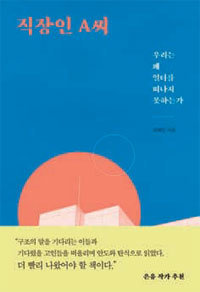You should be placed first before your job
You should be placed first before your job
Posted July. 03, 2021 07:15,
Updated July. 03, 2021 07:15

A company that said it would like to recruit a full time worker but makes you sign a part-time contract, a boss, who monitors you through closed-circuit cameras, pointing out your attitude at work, a high-school senior field trainee, who collapsed while working at a tax accounting firm that forces employees to use the bathroom within five minutes…and the list goes on.
The author, who works as a tax accountant, reflects on work and people by going through the list of abuses of power at work. Why are people unable to quit their job even though they are harassed at work and suffer from excessive workload that their health fails? According to the author’s analysis, it is because of the benefits the company provides, such as salary and a sense of belonging and because people identify themselves with work, putting themselves on the back burner. There is also a fear that they might not get another job. They believe that once the power tripper at work leaves the company, everything will be solved. But the author firmly says that the responsibility lies with the company that neglected all those problems at work.
When you are power tripped at work, you should not blame yourself but raise a complaint. If you are sick, you should get treated at hospital. The period for applying for industrial accident compensation is three years from the day you first received hospital treatment. Small actions to protest against power trippers include avoid eye-contact with your boss, who hurt you with verbal abuse, not responding if your boss screams at you, or not smiling when someone makes sexist jokes.
As you turn through the pages, readers will think deeply about the company you are in and what problems it has. The book contains appendixes on how to receive severance pay and how to deal with delay in payment of wages, but the book feels more like an essay about the relationship between work and people, and about thoughts on the values of work and people rather than a detailed guide.
The author urges readers to not forget that leaving your job before you suffer from a burnout is a way to protect yourself and that you can make a wise choice when you put yourself first before anything else. The book will give straightforward advises to workers who find themselves troubled at work.
Hyo-Lim Son aryssong@donga.com







